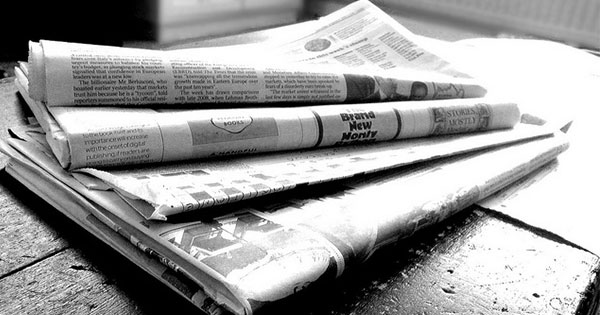
For any number of reasons, when I was a boy, I wanted to be a newspaper columnist. For one thing, my dad was a newspaperman who wrote columns for the small paper he edited. For another we lived in New York, where Murray Kempton and Jimmy Cannon and Jimmy Breslin and Damon Runyon and Red Smith were so good at lean witty regular vertical commentary that many citizens would buy their papers only for their columns, leaving the rest of the periodical in a bedraggled heap in the train station, the barbershop, the shoeshine stand, the hot-dog cart, the park bench, the church pew, the back of the bus.
And columnists were not bound to report, or account facts, or expose scurrilous chicanery, or slather advertisers, or inquire into the squirming prevarications of politicians and their obsequious vassals, or poke into civic or religious knavery, or comment in stentorian tones on grave matters of the day, or delight in bizarre erotic tangles, or delve into the mysterious motivations of thieves, mountebanks, charlatans, clowns, jesters, and other denizens of the public arena. Of course, they could do these things. But they were also free to be raconteurs, gimlet-eyed observers of the motley parade, storytellers, story catchers, hawk-eyed noticers, wry truth tellers, men (and they were almost all men, except for the occasional irresistible force like Mary McGrory away down South) untrammeled by the muddled directives of editors or the airy whims of publishers; their faces were sometimes plastered on the sides of delivery trucks, occasionally you could hear their amused voices on the radio, and they were those luckiest of scribblers, writers who had regular assigned and preserved space, two or three times a week, with one of those stages reserved for the stratospheric reaches of the weekend paper. What could possibly be cooler than being a columnist, free to roam and range and ramble as you like, to inquire and to listen widely and well, to explore whatever subject or character struck your particular and idiosyncratic fancy? And for this you would not only be paid, but edited with the lightest possible pencil, ideally hardly at all, by someone who considered the largely ceremonial task to be more of an honor than a chore.
Thrilling as it was to dream of being a columnist as a boy in New York, it was all the more delightful when I moved to Indiana, where Ring Lardner himself had once been a columnist for The South Bend Times, and then to Chicago, where the greatest of all city columnists was then in his heyday, the glorious prickly hilarious Mike Royko, whose capacious talents were fought for by both the Sun-Times and the Tribune; and then to Boston, where the terrific Bob Ryan of the Globe had become the best basketball columnist in America; and then finally to Oregon, where the brilliant Stewart Holbrook and the wonderfully ornate Ben Hur Lampman had elevated the pages of The Oregonian, the oldest paper west of the mighty Mississippi River, and then handed their inky mantle to the blunt essayist Steve Duin, whose patent pleasure in roasting hapless mayors and pompous governors and devious moguls shone from the page as if his terse sentences had been printed in Technicolor.
And it is here, in Oregon, where I have now lived for a quarter of a century, that I became a columnist myself, for both paper and electronic magazines; but even now, after I have committed hundreds of the brief essays we call columns, I still, when I come to the end of a piece, as now, smile to think that for this moment, a delicious moment, I am exactly what I so wished to be as a boy. How rare and rich a pleasure, to discover that what you are is even better than what you wished to be, so long ago and far away.


